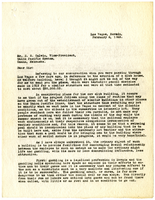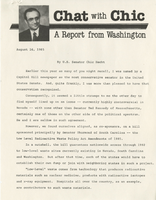Search the Special Collections and Archives Portal
Search Results
Doris Welt, Gerald Welt, and Marcy Welt oral history interview
Identifier
Abstract
Oral history interview with Doris, Jerry, and Marcy Welt conducted by Barbara Tabach on November 30, 2014 for the Southern Nevada Jewish Heritage Project. In this interview, the Welts discuss how they came to Las Vegas, Nevada in the early 1970s from California. They also discuss Eli Welt's pawnshop, Stoney's, which he acquired from Doris Welt's father, Jerry Fox. Jerry and Marcy Welt talk about how they met and came to Las Vegas. They also talk about the community that existed in Las Vegas at the time, and their involvement with B'nai B'rith.
Archival Collection
Nathaniel Whaley oral history interview
Identifier
Abstract
Oral history interview with Nathaniel Whaley conducted by John Grygo on March 06, 2013 for the African Americans in Las Vegas: a Collaborative Oral History Project. Whaley talks about growing up in Las Vegas, Nevada and his adult life on the Westside, the historic Las Vegas neighborhood. Whaley discusses having a successful high school career as an accomplished athlete and being an Eagle Scout in the first black Boy Scout troop in the area. Whaley talks about going on to have a fruitful career as a mason and contractor that helped build the city of Las Vegas.
Archival Collection
Rona and David Mendelson oral history interview
Identifier
Abstract
Oral history interview with Rona and David Mendelson conducted by Barbara Tabach on April 26, 2016 for the Southern Nevada Jewish Heritage Project. In this interview, Rona and David Mendelson describe moving to Las Vegas, Nevada in 1973 as a married couple and how they became board members of Congregation Ner Tamid, which led them to getting involved with the small and growing Jewish community. They discuss their activities and their current family ties within the Jewish community in Las Vegas. As educators, they also delve into their experiences with the school system in Southern Nevada and the discrimination they faced as Jewish educators and parents.
Archival Collection
Audio recording clip of interview with Ida Bowser by Claytee D. White, August 30, 2007
Date
Archival Collection
Description
Part of an interview with Ida Bowser by Claytee White on August, 30 2007. Bowser describes how she came to work for the UNLV library.
Sound
Sook-ja Kim oral history interviews
Identifier
Abstract
Oral history interviews with Sook-ja Kim conducted by Myoung-ja Lee Kwon on February 12, 1996 and April 06, 1996 for the Women's Research Institute of Nevada (WRIN) Las Vegas Women Oral History Project. Kim begins her interview discussing her family's background in singing in Korea and she then transitions to her and her sisters' arrival to Las Vegas, Nevada in 1959. Kim discusses their Las Vegas act, singing rock 'n' roll tunes at the Thunderbird Hotel. Kim goes on to discuss her groups' big break, performing on the Ed Sullivan Show. Kim describes how this event ignited a successful touring period for the sisters and the eventual launching of another group, the Kim Brothers, comprised of Sook-ja Kim's brothers. Kim ends the interview discussing what challenges Koreans face when moving to America and important information she thinks future Korean immigrants should know or consider.
Archival Collection
Stan Fulton Building Construction Records
Identifier
Abstract
Records are comprised of project proposals, planning guides, and brochures relating to the construction of the Stan Fulton Building for the William F. Harrah College of Hotel Administration dating from 1996 to 1999. The records contain project proposals for the Stan Fulton Building from three different architectural firms. The brochures advertise the University of Nevada, Las Vegas (UNLV) International Gaming Institute, which is housed in the Stan Fulton Building.
Archival Collection
Gue Gim Wah oral history interviews
Identifier
Abstract
Oral history interviews with Gue Gim Wah conducted by Elizabeth N. Patrick on September 23, 1981 and September 24, 1981 for the Ralph Roske Oral History Project on Early Las Vegas. In this interview, Wah discusses her life as a Chinese immigrant, her husband's life, and running the dining operations at the Prince Mine near Pioche, Nevada. Wah describes arriving in the United States as a child and the difficult immigration process she faced. She discusses her marriage to her husband, Tom Wah, and his life working for the railroads and as a miner before running a boarding house and restaurant for those working in the Prince Mine. Wah later talks about her experiences running the boarding house after the death of her husband in the early 1930s. Throughout the interview, Wah describes different aspects of Chinese culture and what life was like living in a Nevada mining town during the early twentieth century.
Archival Collection
John J. Weeteling oral history interview
Identifier
Abstract
Oral history interview with John J. Weeteling conducted by his son, Terry Weeteling, on April 07, 1976 for the Ralph Roske Oral History Project on Early Las Vegas. In this interview, Weeteling describes moving to Tonopah, Nevada in 1942 while enlisted in the United States Air Force and life in the town. He talks about moving to Ely, Nevada in 1945 and working there as a truck driver, how Ely has grown and changed, and opening a paint and body shop in Hawthorne, Nevada. Weeteling continues, explaining why he moved to Henderson, Nevada in 1947, joining the fire department on the Basic Magnesium Plant compound, and describes life in Henderson. He then describes moving to Las Vegas, Nevada in 1951, Fremont Street during the 1950s, and the development of the Las Vegas Strip. Weeteling concludes by discussing local politicians, his recreational activities, ghost towns in Nevada, and nuclear weapons testing.
Archival Collection


